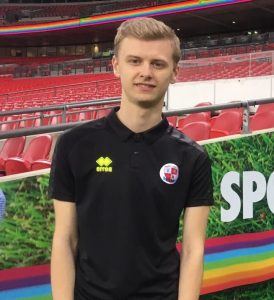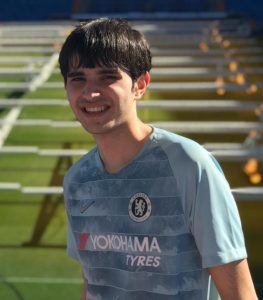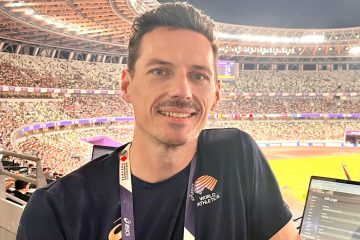IDAHOBIT, and homophobia: Sports and thoughts
Four out gay sports journalists describe the effects of homophobia, and suggest what the sports media industry can learn…

Last October, you told us that incidents of homophobia are not uncommon in the sports media industry.
Over 45% of those employed in sports who took the survey said ‘yes’ when asked if they had witnessed or experienced anti-LGBT language or behaviour in an industry workplace in the previous two years.
LGBT-phobia affects us all. For example, you don’t have to be gay yourself to feel hurt by homophobic abuse. In sport more generally, we’ve often seen examples of this – comments aimed at Graeme Le Saux during his playing career; some of those sent on social media more recently to a current Chelsea player, Ruben Loftus-Cheek; or the chants directed at Brighton fans by opposition supporters over many years.

When we looked at the responses to our survey question on homophobia, biphobia and transphobia that were given by LGBT people only, the percentage saying ‘yes’ jumped to just under 54%.
Even though the coverage of ‘out’ gay and bi athletes in our newspapers and digital platforms, and on our broadcast stations, is almost always positive and supportive, the survey results suggest we haven’t done enough to make our own workplaces inclusive.
When it comes to trans and non-binary inclusion, representation of those voices is so low in sports media that many opinions made in the media about trans and NB athletes simply go unchallenged, creating a narrative that keeps trans people themselves on the sidelines.
To mark the annual awareness day IDAHOBIT – the International Day Against Homophobia, Biphobia, and Transphobia – on May 17, and to address the issue within our industry, we invited four out gay sports journalists to share their thoughts and experiences on the topic.
Thank you to Jack, Craig, Luke and Danyal for their contributions to this article, and for providing visibility in sports media.
Our network exists to bring all LGBT+ people and allies together in the pursuit of inclusion. Please reach out to us for support and advice – see our Contact page for details.
Jack Murley (BBC Cornwall; host of the BBC’s LGBT Sport Podcast)

Before I launched the BBC’s LGBT Sport Podcast, I’d always been pretty lucky when it came to my experiences with homophobia.
Perhaps ‘lucky’ is the wrong word to use when we’re talking about being attacked because of who you happen to be – but it’s true. I was lucky. The colleagues I shared a press box with didn’t care I was gay, nor did the players I commentated on, or the clubs I worked with. Homophobic comments, as and when they came, were pretty low-level and could be easily brushed aside. I’ve always had a thick skin and, like I say, I was lucky.
Then the podcast launched, and things changed. We started small, so people really didn’t know that much about us – but as the show got bigger, the homophobia began. A new episode would go live and be shared by BBC Sport, and the comments would come in.
“I hope everyone stops paying their licence fee and this pathetic show goes under”…. “Another extreme effort at the BBC being PC and promoting something disgusting”… “Change the record, it’s all you people talk about”.
Just trolls? Perhaps – but there’s always a knock-on impact. The same people would go to the podcast’s page on iTunes and spam it with bad ratings and reviews, deliberately dragging it down the charts. And if you’d plug the podcast on-air, the texts would start coming in.
“Did I just hear you say you were gay?! That’s ABSOLUTELY DISGUSTING and you shouldn’t be on the radio. TURNING OFF NOW!”
In the most dramatic situations, it’d spill over onto real-life. One Sunday night, I was playing in a badminton tournament at my local club, and was drawn against a guy in his 40s. We’d just started promoting the podcast on-air, which wouldn’t be relevant apart from what happened next. From across the other side of the net, he looked at me and spoke…
Heard about the podcast. Come on then gay boy, let’s see what you’ve got!
Then again, and again, and again, in a low, aggressive tone. I was genuinely speechless – shell-shocked, in fact, unsure what to say or do. Call it out? Walk off the court, and throw the game? Or do nothing, let the comments go unchallenged, and simply accept it.
I’m ashamed to say I did the later. I let it slide, won the game, shook hands with him after and walked off the court. My decision bothered me then, and it still bothers me now.
Now, I know the above is written in the past tense – but the abuse still happens. I still get homophobic texts and tweets – and they’re far, far more than I had before we started the LGBT Sport Podcast. Launching the show has led to more homophobia entering my life than ever before – and even though I’m a pretty resilient man, there have been days where it’s ground me down.
But I also want to be clear that the support I get from the sporting community far outweighs the hate. For every bone-headed, bigoted remark that comes my way, there are three more from people I’ve never met, telling me to keep going. For every hurtful text, for each unsolicited email telling me I’m “going to hell”, there’s a Twitter DM or a Facebook comment from people I forgot I ever knew, telling me that even though it’s been a while since we last spoke, they’ve still got my back.
And it’s not just friends or colleagues – but the people I’ve commentated on over the years, speaking out and condemning the hate. Often, they’re heterosexual, cisgender players who might not even know what the term ‘ally’ meant but who – because they’re good, decent folks – feel compelled to speak out against it and, in the process, are acting as allies as without even realising they’re doing so.
So, have I experienced homophobia, and do I continue to experience it? Absolutely – but what sticks with me more is the support, the love and the solidarity I get from the vast majority of the sporting community I’m lucky enough to work in.
There’s that word again. ‘Lucky’. Seems an appropriate one to end on, really.
The BBC LGBT Sport Podcast has now run for over 40 episodes and is nominated for a British Podcast Award in the Sport category. Learn more about Jack in our ’21 Questions With…’ interview from last year.
Craig Bratt (Social Media Co-ordinator)

I think homophobic incidents in British football are increasing, to a point where these days I’m no longer shocked by the latest revelations in the media.
I’d been lucky enough never to have experienced any homophobia aimed towards myself for a very long time – until last month.
I’ve recently left my position at Crawley Town FC, my club since I was a boy, where I was the Media Officer since the start of the 2018/19 season. It’s of course a fanbase I know well and connect with, having not long left the terrace for the press box.
The club has always been very supportive of any LGBT campaigns from the FA or EFL, and were also always very supportive of me. That wasn’t just from the board and staff either – I was always open to the players, playing staff and management as well, and I was extremely grateful that I was accepted and treated no differently, to the extent where my boyfriend would regularly mingle with my colleagues and players after a match.
It was my final match working for the club in April and we were in a bad run of form. A group of supporters who I’d had disagreements with over the past few years had regularly tweeted the club’s social media in disgust at posts encouraging the team or those that said we were playing well when losing.
They were never personal, and I’ve always been well aware that social media is all about opinions. Sadly though, for the first time, on my final match, it did get personal, as one supporter name-checked me in a post to the club and used homophobic language towards me online.
I’ve never been one to get upset over comments such as these, but rather than brush it under the carpet, I decided a simple quote of that tweet on my personal account, promoting what this supporter had said was enough for me – needless to say, fellow fans and people across my Twitter followers strongly condemned what was said.
To me, the matter was over – despite the fact it had soured what was my emotional final day at the club. The support I received nationwide was enough for me to consider the matter closed.
I was approached a couple of hours after the game by our Commercial Manager and our Operations Director, who both said they had seen the post and as a club were going to take action. To know that the club took a strong stance against this type of discrimination was humbling for me. The supporter was banned and once again, the social media world rallied around the club in support of the action taken, which had been posted as a club statement on the website.
I’m thick skinned, so it didn’t faze me in any way and I’ve come to understand that, sadly, homophobia will never be eradicated in society. The positives to take from the incident however, is that in my experience, people are rightly quick to call out discriminatory language and support the victim, and are correct to condemn the actions.
If we are to ever wipe the problem out of football, we need education. We need workshops and roadshows, and stronger punishments for offenders. At the end of the day, a homophobe is a homophobe, whether they’ve been banned from a stadium or not – and that’s the simple truth.
Luke Gardener (US Sport Editor, Daily Express)

Working in a male-dominated sports office of a national newspaper, you’d probably expect there to be homophobia on a regular basis.
But in my experience, things are a lot better than what people perhaps think.
Whether that’s because they know I’m gay or not is another question, but I have only witnessed issues with staff using homophobic language a couple of times.
That’s pretty remarkable, considering I’ve been with my current employees for almost four years.
And knowing that staff respect my sexual orientation and realise it has no bearing on how well I can do my job is something I could only have dreamed of as a teenager struggling to come to terms with my sexuality.
For me, being out and proud in a sports media position is crucial to help progress things on a wider level.
To be quite honest, the place I receive most homophobic abuse is on social media.
My profile has the rainbow flag front and centre in my bio and it does make you an easy target for the keyboard warriors who respond to the latest transfer story you’ve written with homophobic abuse.
Like anyone you try to not take it to heart but as every gay man will tell you, that’s easier said than done when we’ve all been at school and heard the word ‘gay’ used as an insult.
For me, sports media is moving in the right direction and hopefully more LGBT+ personnel in editorial positions can help influence coverage on a wider level.
The way in which stories are reported can act as an education to anyone and everyone, particularly when it comes to LGBT+ issues coming up in the sports sector.
Of course, there is still plenty to do – and the real test is likely to come when a professional male footballer playing in Britain eventually comes out publicly as gay or bi.
Danyal Khan (journalism student, University of Gloucestershire)

I’m currently in my first year of studying sports journalism. At the start of the year, I had bad vibes that my course-mates viewed me as a joke on the course, as they know that I’m openly gay. Those bad vibes were confirmed when two guys told me that I should be doing fashion, as I would fit in more in that industry.
This comment really hurt me. Being a sports journalist has been my dream for a long time. I found the strength to ignore the comment, and in fact I’ve used it as motivation to prove them wrong. And as my first year finishes, I feel like I’ve gained more respect from my course-mates, now that I’ve proven I’m good enough to be here. Most people have seen some of the work that I’ve produced for the likes of The Chelsea Echo, and the work I’ve been doing on podcasting this year.
There’s one main thing that I’d like to change in relation to LGBTQ representation in the sports media, and that’s in relation to inclusivity and representation. When I was much younger, I had no LGBTQ sports journalists to look up to, and initially, as a result, I thought this industry wasn’t for me.
There are a few nowadays, but not enough. I feel like there’s still a fear amongst the LGBTQ community that they won’t be accepted or feel welcomed in the sports media industry, due to the expectation of being discriminated against.
What I want to see happen is a movement to try and encourage more LGBTQ representation in the industry, like there’s been a campaign to get more female sports journalists.
I also feel like it would be great to see the current LGBTQ representation of sports journalists in the industry help the younger LGBTQ aspiring sports journalists to break through. This could be done by a mentorship scheme. It would be great to see work experience opportunities being offered to help those younger LGBTQ journalists know that there is a place in this industry for them.
In my view, there isn’t a lot that sports media courses run by universities or colleges can do to make LGBTQ students feel more included. The only thing I would suggest is that some of the lecturers could make more of an effort to be welcoming towards LGBTQ students.
There have been a few lectures this year where we have looked at issues in sport, but the only ones of mention are racism or the lack of females in the industry. I don’t feel like enough is done to cover LGBTQ issues in sport. If rectified, that would help make me and other LGBTQ students feel more included.
Another way to do that is by trying to get current out LGBTQ sports journalists like Mark McAdam and Jon Holmes to come in and do talks with students about what it’s like to be LGBTQ within the industry. We’ve had great talks this year from the likes of Michelle Owen, Faye Carruthers and Leon Mann. Each spoke about issues they have encountered in relation to sexism and racism in the industry. Universities should also go out of their way to try and get LGBTQ sports journalists speakers in to deliver talks.
***
We’re grateful to Jack, Craig, Luke and Danyal for taking the time to discuss a difficult topic in such a positive and forward-thinking way.
Sports Media LGBT+ is here to help you – whether you’re LGBT+ yourself, or you’re an ally who wants to take positive steps on diversity and inclusion. Drop us a line and we’ll get back to you ASAP.


